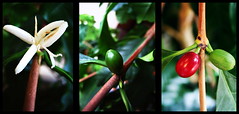
Originally uploaded by asteri design.
Terroir in a direct translation from French yields us simply 'earth' or 'land.' The basic interpretation of this is to say that a product has a distinct association with the land on which it was produced. Stating that the product is representative of it's origins would be the same as saying a product is expressing it's terroir. The term is difficult when trying to apply this to coffee or tea given the disagreements over the specific definition of this topic in wine.
The most simplistic definition of terroir I came across in my research was simply that terroir is a 'sense of place' that a product has. The terroir of a coffee is very broadly defined as the site or region influences that cumulatively give the coffee an attachment to it's origins. It is not simply the taste of earth but all the contributing factors therein that add to flavor. There are two ways the term terroir is approached in wine from which we draw parallels, but we first must have a better understanding of French culture and the approach they have to terroir in not just wine, but an array of products not limited to only the agricultural ones.
The French approach terroir as a philosophy in life. The love of dining and appreciation for local farmer's markets along with a focus on fresh ingredients are important to the French food culture. To the French, terroir seems to be applicable to any product, even clothing, which exemplifies the unique characteristics of a specific area. The traditions or methods of production can be added to the unique (soil, geography, climate) and physical(minerals, soil acidity, etc.) characters of that producing region in describing the product's terroir.
Much like Champagne is only truly a Champagne if produced in the Champagne region of France, this is the predominant view of terroir. The attitude is to preserve this uniqueness where in some cases it may not be viewed as desirable. In France it appears that saying something has terroir is to say that it represents where it was produced well.
The French focus is very much based on the importance of where it was grown over what varietal is used or the producer. The French love of terroir has worked to produce both quality and diversity in the French food, wine, and cheese market. In essence, the opposite to the mass produced commodity cultures you see in other countries.
There are two approaches to the concept terroir we must be aware of. The Old World approach and the New World approach.
The Old World approach is simply the previously mentioned French approach to terroir. To say, in wine specifically, that the flavor of the cup comes from the soil, geology, aspect, altitude, and other factors. An example is to draw a direct corollary between the flavor and the inputs from the soil. This would be to say that since this tastes of mineral and there is strong mineral content in the soil therefore it must be associated and therefore preserved. Each areas unique character is presented in the cup. It could be stated that Old World philosophy is more about restrictions placed on the product to achieve a specific representative quality much like AOC. In essence, the French label would focus on the growing region over the varietal or producer. For example, the French would say it is not a Pinot Noir produced in Burgundy but rather it is a Burgundy that happens to be made of Pino Noir.
New World philosophy seems predominantly based on viewing all the inputs as part of quality. They aim to use the terroir of the region to achieve a product they deem more quality. This is to say, they break down their lots into similar producing groups and attempt to achieve something of greater ripeness and evenness. Terroir is in essence an approach to quality in where defined standards are not traditional defined for the producing regions. The focus leans on the varietal used and not so much on the region. A means to an end if you will, where preservation of the traditions is not such a defining factor.
Applying terroir to coffee is very difficult to understand and this is why I have undertaken this project. Since the term is being thrown around a lot these days in the coffee cognesceti(as one roaster put's it), I feel it's time to begin thinking about this and research it more. Once we can begin to comprehend the term terroir, you begin to see how it is applicable in quality coffee. Silas believes the closest approach in Tea is that of Biodynamic teas, but that's an article for him to write.
Now, when someone speaks about the terroir of this coffee, you will understand what they are saying. Next time you are at your local roaster and they say, 'This is an exemplary Kenya, very expressive of what a good Kenya coffee should be!' Once tasting it, to agree your response could be, 'Yes, I see the terroir in that coffee!'
